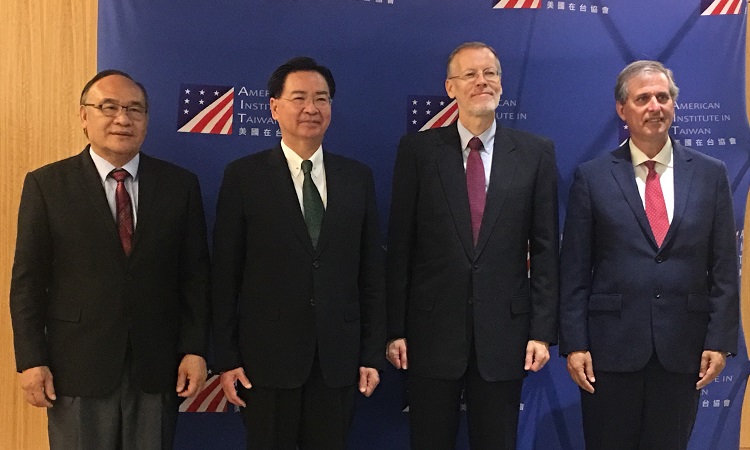PR-1943
September 12, 2019
The Inaugural Session of the U.S.-Taiwan Consultations on Democratic Governance
in the Indo-Pacific Region
On September 12, 2019, the American Institute in Taiwan (AIT), in cooperation with the Ministry of Foreign Affairs and the Bureau of Democracy, Human Rights, and Labor of the U.S. Department of State, launched the inaugural session of the U.S.-Taiwan Consultations on Democratic Governance in the Indo-Pacific Region. This important new forum serves as mechanism for the United States and Taiwan to meet annually to explore ways to increase our cooperation and pursue joint projects in the region that assist other countries in addressing the governance challenges of the day. Please see attached fact sheet on the U.S.-Taiwan Consultations on Democratic Governance in the Indo-Pacific Region for more information on this initiative.
Fact Sheet: U.S.-Taiwan Consultations on Democratic Governance in the Indo-Pacific Region
The U.S.-Taiwan Consultations on Democratic Governance in the Indo-Pacific Region is a new annual dialogue mechanism that was officially announced on March 19 by Taiwan Foreign Minister Joseph Wu and AIT Director Brent Christensen. The Consultations are meant to formalize, regularize, and deepen cooperation between the United States and Taiwan on promoting good governance in the region. The U.S. delegation is being led this year by Deputy Assistant Secretary of State Scott Busby, who serves as the senior bureau official in the Bureau of Democracy, Human Rights, and Labor in the U.S. Department of State. Taiwan’s delegation is led by Deputy Foreign Minister Dr. Hsu Szu-chien.
Taiwan has accomplished great things in the realm of democratic governance, and the United States wants to increase its work with Taiwan to share the lessons Taiwan has learned with others in the region who are seeking to make progress in their own countries. Taiwan has had remarkable success in protecting the rights of minorities, facilitating interfaith dialogue, empowering women to participate fully in the workplace, including in the political arena, and holding elections that are credible in the eyes of its voters and international observers. Sharing these and Taiwan’s many other rich experiences with the broader region can contribute to greater prosperity, better governance, and stronger regional security. Modeling good governance is one of the many ways that Taiwan is a valuable partner for the United States in promoting a free and open Indo-Pacific region.
The goals of the Consultations are to:
- Promote a free and open Indo-Pacific: The United States and Taiwan share a commitment to promoting freedom and openness as core values that bring order and security to the region. Liberal democratic norms should govern the resolution of regional disputes and no nation should resort to coercion to advance its interests at the expense of others. The Consultations seek to inculcate the values of freedom and openness and encourage nations to embrace these values as indispensable components of modernization.
- Promote Taiwan as a model of good governance: Taiwan has proven time and time again that it understands how to respond effectively to the needs of the public while governing democratically and protecting minority rights. The Consultations seek to promote Taiwan as a regional model through efforts such as the Indo-Pacific Transparency Initiative.
- Promote joint programs that help other countries in the region: The Indo-Pacific region can benefit from the lessons Taiwan has learned. The Consultations seek to develop and implement joint programs in other countries of the region that address current and future governance challenges while promoting democratic values and norms.
- Promote Taiwan’s international presence: While Taiwan’s formal diplomatic space may be constrained, the Consultations can utilize Taiwan-based and international NGOs, the private sector, and academia to enable Taiwan to expand its international presence and amplify its contribution to global problem solving.
AIT will provide further details about the programs and future events related to the Consultations as they become available.
















![Video Thumbnail [Recovered]-01](../wp-content/uploads/sites/269/Video-Thumbnail-Recovered-01-1-750x450.jpg)





